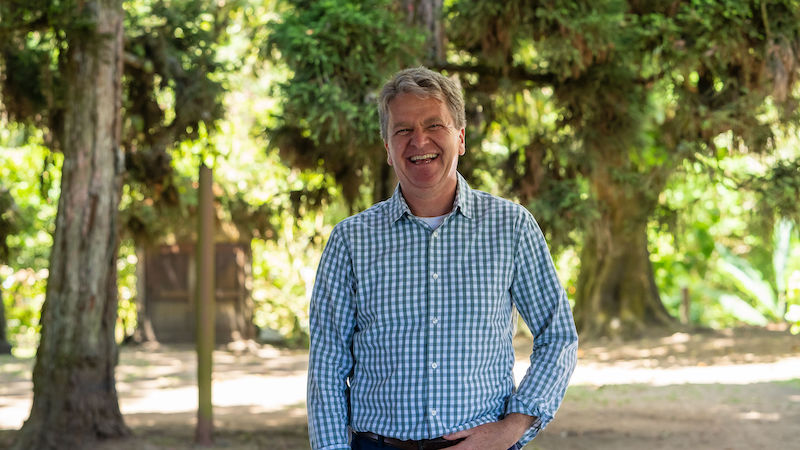
Hans Pfister is on a mission to show the hospitality industry that ensuring sustainability in both the environment and his teams is not only the right thing to do but plays a key role in delivering business performance.
Founder of the Cayuga Collection, a hotel management company in Costa Rica, Hans started the company after spending years as a general manager at hotels in both Costa Rica and Germany.
His properties have received extensive coverage for their sustainability, and we recently spoke about the operations and business behind the brand.
How Hans built his career in hospitality
Hans grew up in southern Germany’s Black Forest region. After graduating from high school, he started an apprenticeship in a five-star luxury hotel with a three-star Michelin restaurant.
“It was a traditional European-style apprenticeship that taught me the basics of providing luxury hospitality.”
From there, he studied at Cornell University, receiving a degree in hotel administration. That’s where he met his wife, who is from Costa Rica – where they ended up settling down. “I fell in love with a country and I’m still here 25 years later!”
Why Hans works in hospitality
Hans’s initial draw to the industry came from his desire to see the world and meet people from other places. He knew hospitality would give him a chance to do that.
This urge to experience other cultures led him to be an AFS exchange student in the US when he was 16, and he met people from all over the world at his school.
Hans also had a passion for serving people. “It always made me happy to see other people happy. Whether it was that a party or an event, I always enjoyed serving and helping and creating the experience for others.”
The lifestyle of working in hospitality was also attractive to him. “Hospitality is never boring, never the same thing. There’s always something new happening.”
This mix of getting to meet people from all over the world, travel internationally and serve others came together in a career in hospitality for him.
Inspired to do better: starting Hampton Inn’s first sustainability program
Hans’s first management experience in hospitality took place in San Jose, Costa Rica. He followed his then-girlfriend (now wife) to the country and had an opportunity to open the first Hampton Inn hotel there in 1994.
“It was fun, and I learned a lot – but I was very frustrated by the limitations of sustainability at the time.” As operations manager, he saw the impact of everything from single-use plastics to disposable foam cups – and felt there was room for improvement.
“I launched our first sustainability program at that Hampton Inn in 1995,” Hans recalled. “As you can imagine, people looked at me like I was really weird. Sustainability in hospitality was not on anyone’s radar.”
The program was called “Think Green” and included things such as dispensers for soap, reusing towels, a recycling program, and more efficient light fixtures.
“All this sounds familiar by today’s standards – but in 1995, it was novel for the hospitality and tourism industry. It earned a lot of press coverage for us at the time.”
After a couple of years leading that property, he wanted to experience being a general manager in a different environment and took the opportunity to lead the turnaround of an underperforming business hotel in Stuttgart, Germany. It was a good experience for him, where he learned a lot about what it takes to turn around an underperforming hotel asset.
But then he got a call from Costa Rica from a hotel owner with a problem.

The “eco-lodge owner dilemma”
The owners of Lapa Rios Lodge were originally from Minnesota. They sold everything, moved to Costa Rica, and built a hotel and school in the community. “All of a sudden they had a hotel operation to run – and the day-to-day operation was not what they dreamed of doing.”
What these owners were facing is at the crux of what Hans now calls the “eco-lodge dilemma,” which includes the need for professional management, a process for ensuring land is preserved, and figuring out an exit strategy.
The owners of this property hired a management company to guide them through this, which was the company Hans worked for – and eventually became Cayuga. The company was able to put the property into a conservation easement and protect the reserve in perpetuity. They put together an exit strategy that was realized in 2019.
“It’s important when you start a hospitality business that it’s also a financial success. With our expertise and management, we were able to ensure a successful business that became desirable for someone else to want to buy.”
This process has been a recurring theme in what Hans has seen in the market – owners and investors have a vision but need a partner to run the day-to-day so they can move on and do other things.
This experience led to the framework of what Cayuga is today: A management company that helps owners of small, sustainable hotels and eco-lodges in remote places run the day-to-day and free them up to do other things.
“No major brand wants to deal with this because it’s too hard, too remote, and not profitable enough. But we found a way where we could come in and help these owners be successful financially through doing good in the community and preserving the environment.“
Why Hans runs Cauyga as a hotel management company
The way Cayuga was formed happened organically as a way to help these owners. “We basically just filled the void that was there, found we enjoyed the process – and still do.”
A hotel management company is an asset-light business model where there’s some level of flexibility. “We’re not stuck with something we can’t change. We can make adjustments. We can go into other markets.”
As an example, through the pandemic, Cayuga started to also manage luxury homes. “We started with a 10-room luxury home in Santa Teresa and found it’s very similar to what we do with our resorts.”
This business structure allows them to operate with agility and capitalize on opportunities for implementing their vision of what hospitality can provide.
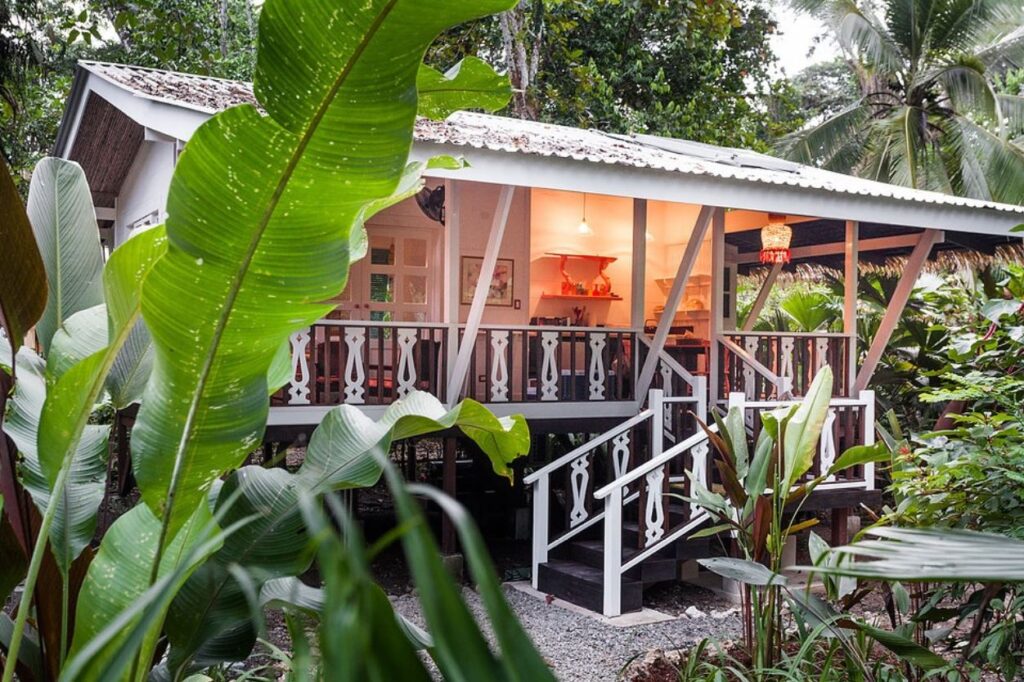
Providing exceptional hospitality by taking care of people
A consistent theme of both guest feedback and coverage of Cayuga by travel journalists is the people that work on each property and provide hospitality.
“I think what people like is the interaction with our people. It feels authentic and it feels special because our teams are proud to work here and are so engaged.”
Guests and travel journalists alike consistently talk about how engaged the staff is and how pride in their work shows through. “They are really so proud to share their country, their region, their wildlife, and everything else with our guests – and that makes all the difference.“
Cayuga does a lot to take care of its people. They only hire local people for both line staff and management positions and invest heavily in training and benefits for them. They provide things such as a company doctor that takes care of staff – and their families. They employ their associates year-round, and not just in the high season.
“Providing great amenities may not seem super innovative if you work at Google or Facebook, but if you work in a remote place on an island somewhere with little infrastructure, it’s quite special.”
How Hans thinks about hiring
Hans doesn’t typically hire people with a lot of experience.
“When we take over a hotel or start a new project, we don’t necessarily look for people who have a lot of experience. We’d rather work with people that have a passion for wanting to serve.”
What does that look like practically?
The “pen drop test”
Candidates who pass Cayuga’s interview process do a 2-3 day trial period working on the property. During this time, managers look for little things that indicate a willingness to serve.
“If a pen drops, for example, is the candidate jumping on that pen to pick it up or just looking at it and trying to figure out if they should pick it up or not?” It’s those little things that show how someone is wired.
Cayuga is also looking for people who will be social. “In hospitality, it’s good to be social. We want people who are great at small talk and are naturally curious about other people. Our trial period helps us understand that.“
After just a couple of days, it’s often clear if this person is someone that will be a good fit or not.
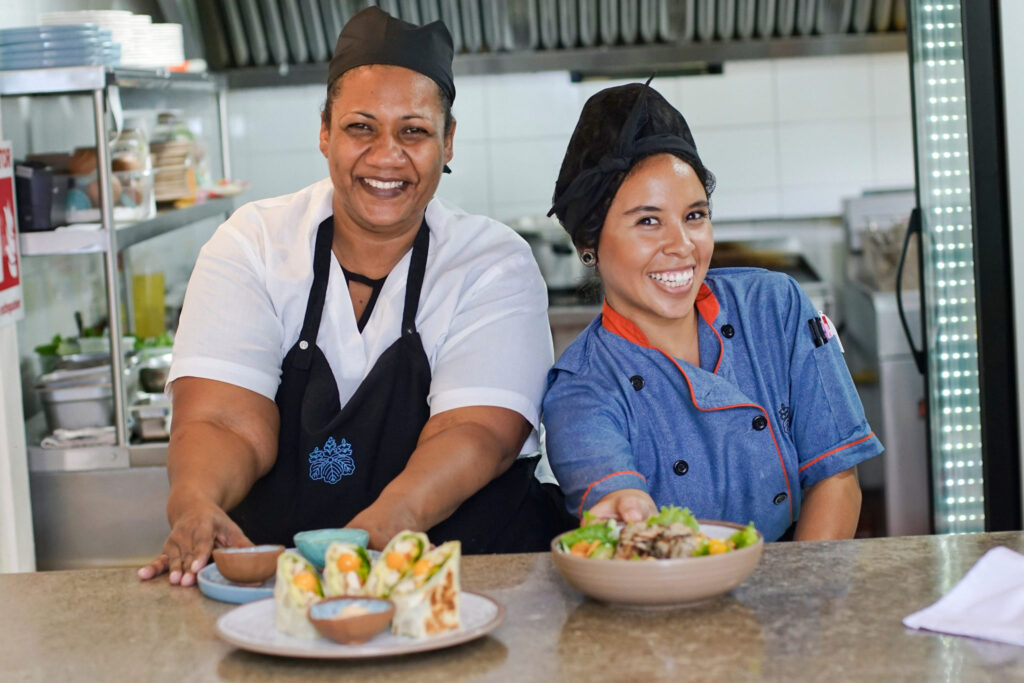
The Cauyga training program
For Hans, one of the advantages of being a management company with a collection of properties versus an individual hotel is there are resources to invest in training.
“We have a corporate team that comes in and trains our staff. We have the opportunity to do cross-training – and have found this accelerates the development of our associates tremendously.”
Every person who joins the company has a personalized training plan created for them that helps them learn how to provide exceptional hospitality. Recently, the team has incorporated more videos in interactive training, especially around things such as technology use. “We have found it’s increasingly important to make our training more technology oriented.”
Where most hotel training programs go wrong
Since Hans had experience running branded properties before starting Cayuga, I was curious where he thinks most training programs go wrong.
“Too many hotel training programs stop after their managers think the person can do the work,” he said. “They go through a week or two of training and then the person is on the ground. There’s no follow-up.“
What Hans and his team do differently is providing ongoing training and development, customized to the career path that person wants to follow.
Cayuga’s training programs go on for months if not years. The brand is committed to each associate learning and growing over the long term.
“It’s important not just to tell a person to go do their job once they have had initial training. You need to provide ways for them to grow in their current job, and also learn new things about other roles if they want to progress their career in that way.”
Too many in the industry view learning and development as “set it and forget it“ – and there’s an opportunity for hospitality companies to provide continued investment so their teams provide a competitive advantage.
Building career paths
For many, the hospitality industry provides a unique opportunity for upward mobility.
“If someone really has a passion for hospitality and wants to grow, there are a lot of opportunities in our industry. What gets me out of bed each morning is the chance to help people progress in their careers,” Hans told me.
There are many examples of this at Cayuga. A 17-year-old who started as a receptionist and 10 years later was the general manager of the hotel. The construction worker who was laying bricks and 10 years later running operations for the hotel. The gardener who worked at three Cayuga Collection hotels and now is the operations manager.
While significant career progression is a goal for many and something that every company should aspire to provide, Hans also recommended looking for and celebrating stories of incremental progression.
“Celebrate the housekeeper who puts in the effort to learn English, and learn about food and beverage so that they can work in the restaurant. Recently, we had someone in housekeeping who wanted to go into human resources, so we put together a plan for them on the skills they needed to acquire, studying they needed to do, learning English – and some other skills. And then we help that person acquire those.”
Involving the families of associates in the hospitality experience
A unique program that Cayuga offers is the ability for their staff to experience the hotels as a guest. “Our employees have the right to stay the night at our hotels with their family to be served, have all the food, and experience everything any other guest would.”
This makes a huge difference for a few reasons. “First, the employee feels identified with where he or she works. But even more important, their families understand what it’s like to work on the property. They can talk about it when they come home for dinner. “It just makes them so much more committed to what they do.”
All of these investments in people and culture allow Cayuga not only to provide an exceptional hospitality experience but reduce staff turnover. “Hotels will always have turnover, but it’s low for Cayuga because of how we invest in our people. We earn their commitment.”
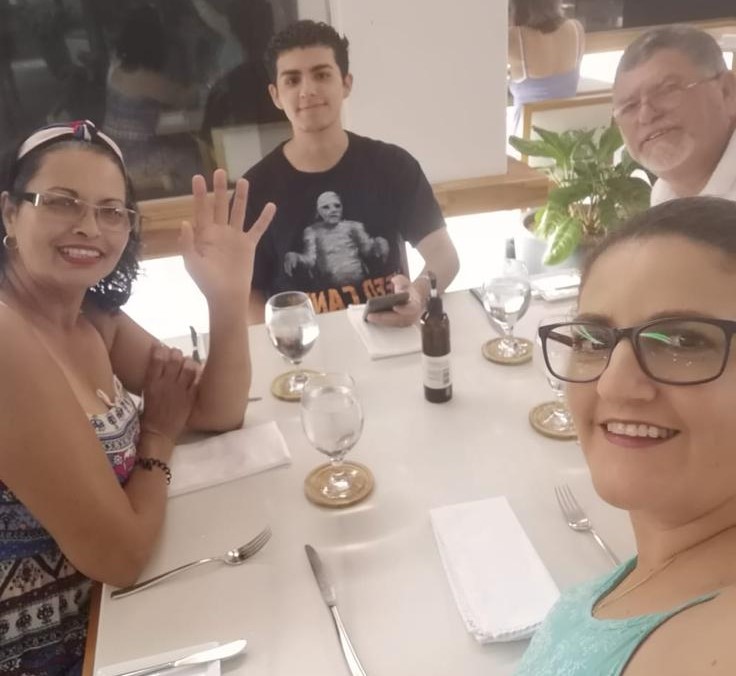
The relationship between people culture and sustainability
Culture and sustainability are closely related, Hans told me. “Taking care of people is taking care of the environment. If people are taken care of and educated, I think they will be more likely to take care of their environment.”
The focus on sustainability for the brand has also been a key advantage for recruiting. “We are able to attract some of the best talent right now, because of our commitment to sustainability. Younger generations, especially, want to work for someone that shares their values around this.”
Hans shared the examples of team members who had switched over from other luxury resort properties because of Cayuga’s commitment to sustainability. “It’s something that gives us the hiring advantage. It’s especially important in a competitive hiring environment.“
The attractiveness of transparent operating procedures
While many hotel operators think about the operation as a theatrical performance where much work needs to happen behind the scenes, Hans views it differently.
“One of the things that we’ve done for many years is providing complimentary back-of-house tours. We believe in operating completely transparently. There are no areas that are a no-go for guests. Our tours take guests through the kitchen, through the laundry room, and through our recycling and wastewater treatment plant. We show them where employees eat and stay. This has a huge impact on our guests because they understand what it takes to operate in a truly sustainable way.”
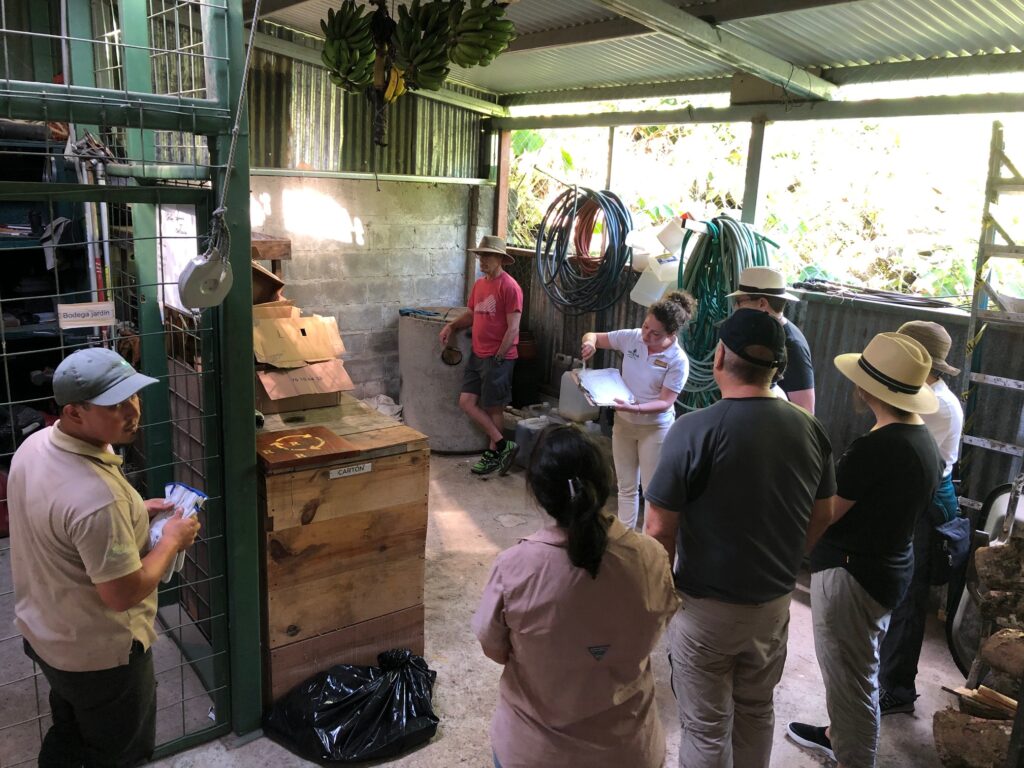
Doing this also allows Cayuga’s back-of-house staff to interact with guests. This is good for both the guests and the staff to get to know each other as people and have an appreciation for the environment they are creating.
“I want my guests to get to know our gardeners, maintenance people, and others that would typically work behind the scenes.“
For Cayuga’s staff members, this instills a sense of meaning and shows that what they do really matters. “It’s a way for us to pay attention to them and honor them in the role they play in creating this experience.”
It’s almost like the chef‘s table at a restaurant: the production process is a performance in itself. You leave with an appreciation for all of the work and artistry that goes into that experience.
“It turns our satisfied guests into raving fans,” Hans said. “Sometimes guests take two hours to go through the tour because they talk so much and want to interact with every member of our team. But they come out of it changed and want to tell their friends and people on social media. It’s played a big role in spreading the word on what we’re doing.”
Hans is a lot more active as a storyteller and social ambassador for his hotels and the people that work there than many hotel leaders, and I was curious why he spends time on this. As you might imagine, it all comes back to supporting Cayuga’s teams.
“I see the amazing job our managers and our people are doing, so at least I can do is share their stories with the world. I want to be the voice to share the amazing things they do because they may not be able to do that.”
“Our brand is a story, and we sell ourselves through storytelling. Hopefully, some of these stories catch the attention of someone who will stay with us.” For Hans, it’s attracting not just any type of guest but someone that resonates with the values they espouse. “Our hotels are unique and different and we want to make sure that we get the sort of guests that care about our back-of-the-house team members and what we are doing to support them.”
Follow Hans here on LinkedIn for more, and learn more about the Cayuga Collection here.









